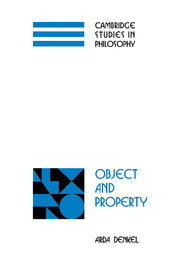Book contents
3 - Individuation and objecthood
Published online by Cambridge University Press: 01 October 2009
Summary
DISTINCTNESS AND OBJECTHOOD
If the world is made of particular substances, there must be some basis upon which they are entities distinct from one another. To exist as a particular, something must be distinct from any other thing, and indeed from the rest of the world. Individuation is a precondition of nature as we have it. A Parmenidean world would be concrete, but because of its perfect homogeneity and continuity it would involve no actual distinction at all. Existence in it would have no plurality: no objecthood, no change, no qualitative multiplicity and no motion would occur there. Aristotle says that ‘a man investigating principles cannot argue with one who denies their existence. For if Being is just one … there is a principle no longer, since a principle must be the principle of some thing or things’ (Physics, i, 2).
Consider now Parmenides' being, the One, ‘from the outside’. Would this constitute reason for objecting to an understanding of individuation as distinctness? Does the logical possibility of a universe with a single individual demonstrate that in its absolute solitude such an individual would be one without distinctness? (see Gracia, 1988, pp. 34–5, 167–8) I think not. First, circumstances in which the distinctness of something does not arise are not those in which the individual fails to be distinct: the former does not amount to the latter. Second, if any other individual existed in such a world, the two would be distinct. Third, any particular physical entity has extension, and therefore parts as potential objects, which become independent as soon as they are detached.
- Type
- Chapter
- Information
- Object and Property , pp. 44 - 70Publisher: Cambridge University PressPrint publication year: 1996



